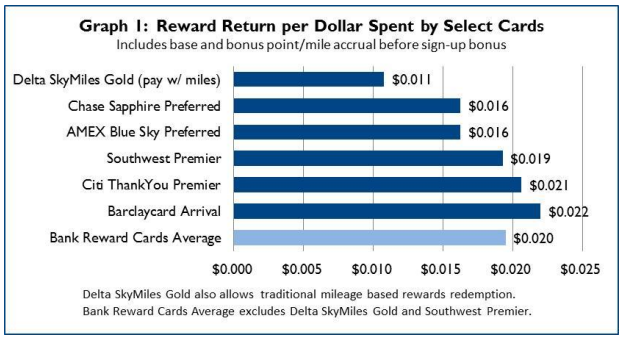There’s an interesting report, written by IdeaWorks, sponsored by Switchfly, reported by Tnooz, and linked to on Flyertalk by luv2ctheworld (…sigh…) that claims to have performed a thorough comparison of the financial return of several travel rewards credit cards. I applaud the report for assigning higher values than I usually see, but there are still some glaring errors.
Wrong: Southwest Premier Beats Sapphire Preferred
Why is this wrong? Because the Sapphire Preferred earns 2 points per dollar on all travel and restaurant spend, plus you earn a 7% annual bonus. The Southwest Premier card earns 2 points per dollar only on Southwest Airlines purchases, plus a 6,000 point annual bonus. You can transfer your Sapphire Preferred’s Ultimate Rewards points to Southwest’s Rapid Rewards program, so if the Sapphire Preferred gives you more points in more categories and lets you use them in more ways, how can its points be worth so much less?

The report argues that Ultimate Rewards points earned with the Sapphire Preferred card earn only $0.016 per dollar spent vs. $0.019 returned from each dollar spent with the Southwest Premier card. I’d reverse that order, and probably make both numbers higher.
Subjective Valuation for Citi ThankYou Premier
I can forgive a little error with cards where you have to redeem a fixed number of points for a variably priced award. Ultimate Rewards points are best transferred to a program like United or Hyatt, where a 25,000 mile flight could cost $120 or $620 and a 22,000 point hotel room could cost $300 or $600. But the Citi ThankYou Premier card is much more clear about how much it’s points are worth, and this report gives it a value of only $0.021 per point. Let’s get our own calculators going.
You get at least 1.33 cents per point, because that’s how much they’re worth when you book a flight using their online reservations portal. You can pay the balance by charging it to your card, so there’s no lost value from “loose” leftover points. Furthermore, you can earn miles on these flights because they book into normal revenue space.
It’s very easy for me to find a $240 flight to cover 6,000 miles. Let’s assume they’re United miles, which I value at 2 cents each. That means I need 18,045 ThankYou points. In return, I will get a $240 ticket and 6,000 miles valued at $120. If I have a 100% 1K bonus, that becomes 12,000 miles valued at $240. So really, those 18,045 ThankYou points are worth $480 to me, or about $0.0266. If you get no bonus, you get only $360 in value, or $.02 per point. This report’s value is at best a floor for Citi’s ThankYou points and doesn’t reflect the most likely valuation for a regular traveler in my opinion.
Good Recognition of Sign-up Bonuses
I will give the report credit for properly acknowledging the added value of sign-up bonuses. It ranks the Chase Sapphire Preferred as the best card after accounting for the generous sign-up bonus, followed by the Southwest Premier and the Citi ThankYou Premier cards. That sounds about right to me. And if you want to do some Delta SkyPesos bashing, it ranks the Delta SkyMiles Gold card pretty low across the board. 😀 Other Delta cards offered by American Express provide better value.
Anyway, I thought some of you might be interested, and others amused, by what the report includes. I also hope that my quick comments will help you view these and similar valuations with a little more skepticism. Remember, valuing miles and points is always about what YOU get out of them. Some people prefer to use the cost of the ticket if they’d paid cash. Others use a lower number because they wouldn’t have bought it at any price other than with miles. If you value your United miles at 1 penny each, your numbers will be lower. What’s important is that YOU have a number so you can do these kinds of calculations yourself.
There is a very important quote at the beginning of the report on page 11 that should be your guiding principle when applying for any travel rewards card:
Individual spending and reward behavior determines how each credit card delivers value for cardholders.
Consumers who plan to use their card primarily for travel expenditures should favor offers that provide bonus accrual for airline tickets, hotel stays, and car rentals. This provides anearnings boost to deliver bigger rewards faster. But another type of behavior is just as important but not as obvious . . . and this is “how” the consumer plans to spend their points or miles.
